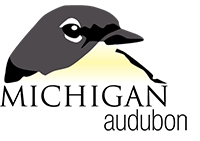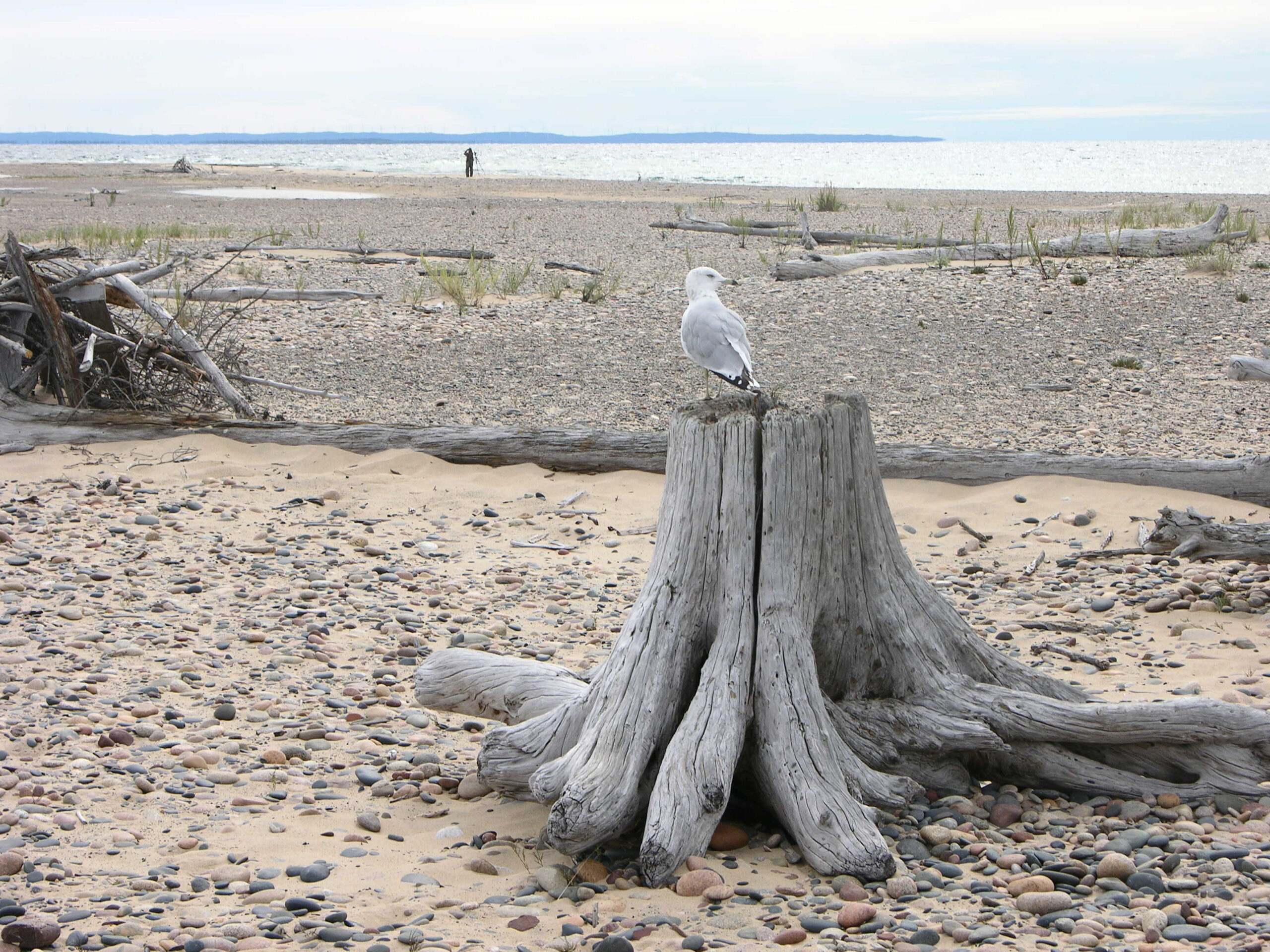Responsible recreation benefits us all. What can we do, as a community, to reduce our impact while continuing to enjoy and protect the flora and fauna of Whitefish Point? Read this short piece to learn how you can help us minimize our impact on the natural wonders that make this region so beautiful.
In addition to a national historic site, Whitefish Point is an invaluable stopover site for birds migrating to and from Canada. Each year, thousands of raptors, passerines, and waterbirds funnel past this point of land that juts into Lake Superior, giving this region its reputation for spectacular birding (and research potential) thanks to high concentrations of birds.
Whitefish Point Bird Observatory was founded in 1979 to document and monitor migratory patterns of birds. Data collected from avian monitoring efforts over the past few decades led to the site’s recognition as a Globally Important Bird Area. The site is world-renowned for the number of owl species that migrate past the Point, as well as its long-standing owl banding program.
Whitefish Point’s natural features include gravel beaches, sandy beach dunes, and stunted jack pine-dominated forest.
With increasing numbers of visitors (in beautiful Michigan summers especially), the collective landowners of Whitefish Point are asking for your help to encourage respectful visitation practices at this special place.
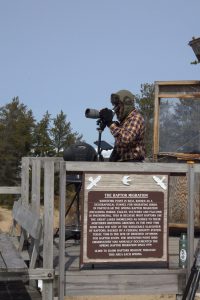
Gary Palmer, spring Hawk Counter at Whitefish Point Bird Observatory, scans the sky for migrating birds.
Visiting Guidelines
- Plan your visit and be prepared. Look into weather, be prepared for mosquitoes (as a rule), and learn about restrictions, rules, and regulations before visiting.
- Visit during daylight hours only; parking is permitted in designated spots from dawn to dusk, year-round.
- Stick to designated trails. Please respect seasonal restrictions in sensitive habitats and avoid climbing on dunes.
- Respect wildlife. Outdoor recreation activities, even birding, can pose threats and/or cause harm to wildlife and habitat. Observe wildlife from a distance, using binoculars whenever possible, and do not follow, approach, or feed wildlife under any circumstances. Michigan Audubon promotes ethical birding standards as outlined by the American Birding Association.
- Keep dogs on a leash. Pets are allowed on leashes at Whitefish Point (except for the federally endangered Piping Plover nesting area of the beach).
- Clear up your trash and leave no trace.
- Use appropriate restroom facilities. Restroom facilities at Whitefish Point are open from May through October and are located in the Shipwreck Museum Gift Shop building.
- Share responsible birding and outdoor recreation tips with friends and family.
Permitted Activities
Birding, hiking, cross-country skiing, snowshoeing, wildlife observation, photography, mushroom hunting, and fruit picking are examples of common, permitted activities at Whitefish Point.
Over the years, small footpaths have been carved into the landscape. While footpaths may allow birders to get a closer look, the dune habitat of Whitefish Point is very fragile and easily damaged. Visitors are asked to remain on current, marked trails and to avoid climbing the dunes and doing further damage to the habitat.
Prohibited Activities
- Camping
- Fires
- Flying drones
- Operating off-road vehicles, including snowmobiles
- Hunting, recreational trapping, or fur harvesting
- Commercial rock collecting, such as paid Yooperlites tours
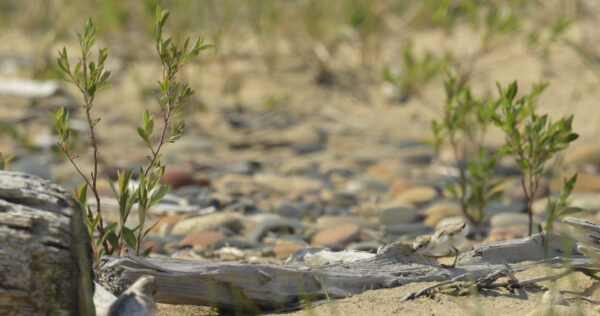
Piping Plover chick at Whitefish Point Bird Observatory. Photo by Laura Wong
Piping Plovers
A large portion of the beach at Whitefish Point is designated as critical habitat for the Piping Plover, an endangered shorebird species. A pair of Piping Plovers returned to Whitefish Point in 2009 and have been nesting there each summer for 12 years. While this is a great accomplishment for a vulnerable species, off-leash dogs remain a significant concern. A Piping Plover monitor team oversees this site throughout the breeding season (summer months). These birds remain incredibly sensitive and vulnerable to visitors who may inadvertently disrupt those that are nesting. Please obey all signs and respect any beach closures to protect nesting Piping Plovers.
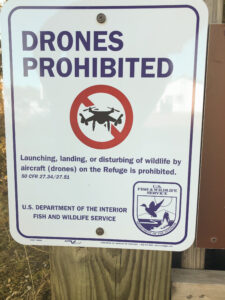 “No Drone Zone” Policy
“No Drone Zone” Policy
For safety and security reasons, the use of drones anywhere on Whitefish Point property is prohibited. We invite you to take photos and videos, but please leave your drone at home or in your vehicle! Thank you for respecting the landowners’ “No Drone Zone” policy!
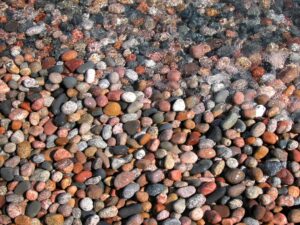
Rocks on the shoreline of Lake Superior. Photo by Julie Falk | Flickr
Rock Collecting*
Michigan has a long history of rock collecting along its shorelines. The Great Lakes Shipwreck Historical Society wishes to continue supporting opportunities for visitors to collect stones in accordance with state regulations (limit of 25 lbs per person per year) for personal use along beach areas owned by the Historical Society (above the ordinary high-water mark) during daylight hours only. Rock and driftwood collecting are not allowed on the Seney National Wildlife Refuge property of Whitefish Point.
*Yooperlites
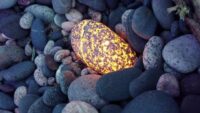 The landowners of the Point continue to receive reports of trespassing as commercial rock collecting activities related to the Yooperlites trend in the U.P. As a reminder for visitors and tourists, Yooperlites tours are not permitted at Whitefish Point, and violators are subject to fines. WPBO is open during daylight times only, and trespassing is prohibited at night. Please notify SNWR Refuge Manager Sara Siekierski of any violations by phone at 906-586-9851 ext. 11 or via email at [email protected].
The landowners of the Point continue to receive reports of trespassing as commercial rock collecting activities related to the Yooperlites trend in the U.P. As a reminder for visitors and tourists, Yooperlites tours are not permitted at Whitefish Point, and violators are subject to fines. WPBO is open during daylight times only, and trespassing is prohibited at night. Please notify SNWR Refuge Manager Sara Siekierski of any violations by phone at 906-586-9851 ext. 11 or via email at [email protected].
This article appeared in the 2021 Spring Jack Pine Warbler.
Other WPBO articles included in the issue are Please Don’t Love the Point to Death: An Earnest Plea for Visitors To Tread Lightly on Whitefish Point and Ways To Support Whitefish Point Bird Observatory.
